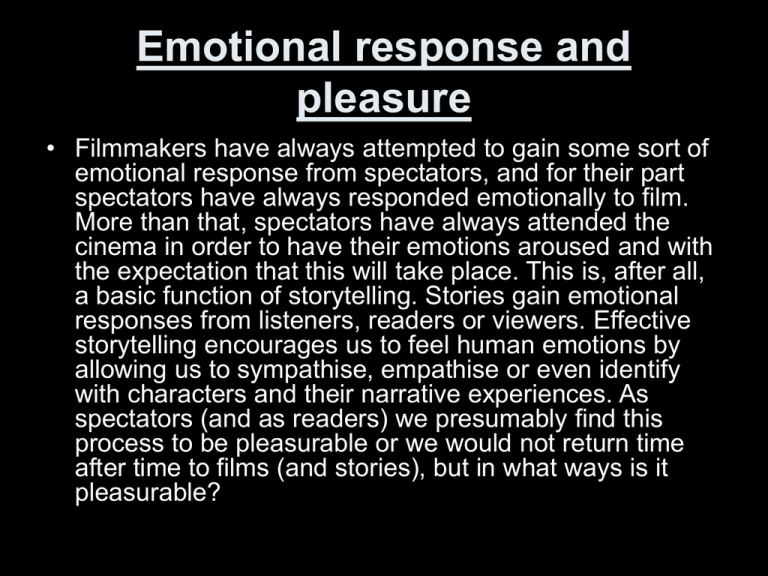
Emotional response and
pleasure
• Filmmakers have always attempted to gain some sort of
emotional response from spectators, and for their part
spectators have always responded emotionally to film.
More than that, spectators have always attended the
cinema in order to have their emotions aroused and with
the expectation that this will take place. This is, after all,
a basic function of storytelling. Stories gain emotional
responses from listeners, readers or viewers. Effective
storytelling encourages us to feel human emotions by
allowing us to sympathise, empathise or even identify
with characters and their narrative experiences. As
spectators (and as readers) we presumably find this
process to be pleasurable or we would not return time
after time to films (and stories), but in what ways is it
pleasurable?
• Entering the window of the hotel room at the opening to
Psycho would seem to encourage the notion of film as
voyeuristically pleasurable
• but what is the connection between voyeurism and
emotional response?
• What sorts of emotional response does voyeurism bring
about?
• Are we being permitted to give rein to a type of human
interest in others that might more normally be considered
socially unacceptable?
• If so, what sorts of emotion do we experience at this
point?
• What emotions are engendered by the vigilante
bloodbath scene in Taxi Driver or the ear-cutting
scene in Reservoir Dogs?
• Do these emotions involve pleasure of some
sort?
• If so, what is the nature of this pleasure?
• If it is not pleasurable, why do spectators watch
these sorts of scenes, deliberately exposing
themselves to a certain type of emotional
response?
‘Shock’ as sudden and
unexpected, or long-drawn out
• ‘Shock’ in film usually occurs as something
sudden and unexpected so that the viewer is as
it were caught unawares. But it is worth bearing
in mind that this is not always the case;
sometimes the shock effect is achieved in a
rather more long-drawn-out fashion. For
example Gaspar Noé makes the inescapability
of rape scene in Irreversible (2002) unbearably
painful as he gives us an experience of shock
not as something sudden but as something of
prolonged intensity.
Irreversible (2002)
• Watch the rape scene mentioned above and
attempt to record your emotional response in as
much detail as possible by noting how you are
feeling throughout the viewing.
• Compare your responses with those of others
who have watched the same scene.
• Watch the same scene again and by making
further notes attempt to see if your emotional
response alters on a second viewing.
• 'Shock' suggests a state of being stunned by what you
have felt to be repulsive in its brutality, so that you (and
probably all watching with you) are startled, surprised by
what you have witnessed, knocked off balance, and
probably very silent.
• But consider another form of possible emotional
response, the tearful response. Is this part of 'shock' or is
it something different?
• For instance, did you have a tearful response to the rape
scene in Irreversible, and if so, was this because of the
shock you experienced or due to something else?
• Discuss this with others who have seen the same
scenes.
Projecting Illusion: Film spectatorship
and the impression of reality
(Richard Allen)
• “Contemporary film theorists argue that, for a
number of reasons, the cinematic image
appears to spectators as if it were reality, but this
appearance is an illusion. In fact, the cinematic
image provides an impression of reality…”
• “Cinema is a form of signification that creates
the appearance of a knowable reality and hence
confirms the self definition of the human subject
as someone capable of knowing that reality…
the reality are the “effects” of a process of
signification”
Projecting Illusion: Film spectatorship
and the impression of reality
(Richard Allen)
• “Contemporary film theorists construe the film
spectator as a passive observer of the image
who is duped into believing that it is real. In fact,
as I shall argue, the film spectator knows it is
only a film and actively participates in the
experience of illusion that the cinema affords.”
Racism and Extreme Politics
• If we move on from issues of sex and violence, it could
be argued that the most shocking elements in films are
not the actual incidents that are portrayed but the ideas
that are expressed and that underpin the events. In
Romper Stomper (Wright, 1992) or American History X
(Kaye, 1998), for example, it is the extreme right-wing
politics and accompanying racial hatred that audiences
may find most disturbing. Both films could be accused of
giving a platform to fascist ideas: in Romper Stomper
Russell Crowe as Hando reads directly from Hitler's
Mein Kampf and in American History X Edward Norton
as Derek gives a powerful 'race hate' speech almost
directly to the camera. Do we as viewers have an
emotional response to these sorts of scenes?
Racism and Extreme Politics
• Using the pictures provided create a mood
board that will chart your emotional
response while you were watching
American History X. Also comment on
your emotional responses towards
different characters, take note if it changed
throughout the film and why.
• Also provide answers to the following
questions
American History X
• How should this film be read and how would different audiences
respond?
• What types of audience would visit the cinema to see this film?
What would be their emotional responses?
• Is it likely that different audiences will respond in different ways?
• Could Nazi skinhead gang members gain their own gratification
from watching these films? If they could, is that shocking in itself
or simply inevitable and not something that should concern the
filmmakers?
• Is it possible to find evidence from within the construction of
these films to suggest the way in which the filmmakers ultimately
wished their film to be understood?
• With which characters is the audience invited to identify?
• Why might censors, or government, consider cutting or banning
this film? Would their concerns be to do with potential emotional
responses to the film?
• Are there any sections you believe could, or should, have been
cut?








